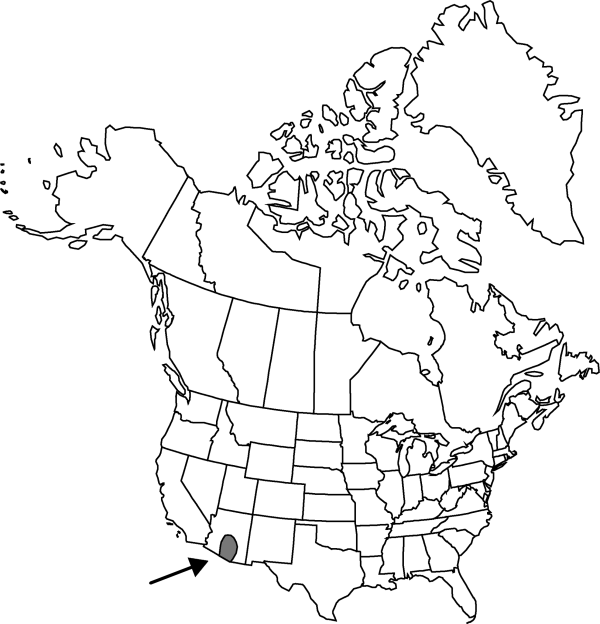Cylindropuntia arbuscula
in C. Backeberg and F. M. Knuth, Kaktus-ABC, 123. 1935.
Trees or shrubs, densely branched, 0.5–3 m. Stem segments green, sometimes purple tinged, 6–10.5 × 0.5–1.3 cm; tubercles narrowly elongate, appearing as wrinkles when dry, 1–2 cm; areoles circular, 2–3 mm in diam.; wool tan to brown, aging gray to black. Spines 0–2(–3) per areole, sparsely distributed along stem, usually deflexed, pale yellow or red-brown aging black, stout, the longest 0.8–3.5(–5) cm; sheaths loose fitting, yellowish brown. Glochids in adaxial tuft and marginal, encircling areole, pale yellow. Flowers: inner tepals green- or orange-bronze, spatulate, 17–20 mm, apiculate; filaments dark green-bronze; anthers yellow; style whitish basally to light orange apically; stigma lobes very pale green. Fruits green, becoming yellowish apically, sometimes tinged red to purplish at areoles, commonly sterile, then narrow, tuberculate, to 2.5 cm, fertile ones stipitate, obconic, 20–50 × 15–35 mm, fleshy, becoming smooth, spineless; umbilicus 3–4 mm deep; areoles 15–17(–34). Seeds pale yellow, angularly circular to oblong, thick, 3–5 mm diam., lumpy; girdle smooth, broad, not protruding. 2n = 66.
Phenology: Flowering spring (Apr–Jun).
Habitat: Sonoran Desert flats, bajadas, desert scrub
Elevation: 300-1000 m
Distribution

Ariz., Mexico (Sonora).
Discussion
Cylindropuntia arbuscula forms hybrids with C. leptocaulis in south-central Arizona; those hybrids have narrow, obscurely tuberculate stems and reddish fruits nearly the size of those of C. arbuscula and chromosome number of 2n = 55. Hybrids between C. arbuscula and C. spinosior [= C. ×neoarbuscula (Griffiths) F. M. Knuth] have large green fruits, which often split open, and on stem segments distal areoles that usually bear three or four spines to 2.5 cm. Hybrids between C. arbuscula and C. versicolor [= C. ×vivipara (Rose) F. M. Knuth] have large green fruits, which often split open, and distal stem segment areoles that bear one or two spines to 1.5 cm.
Selected References
None.